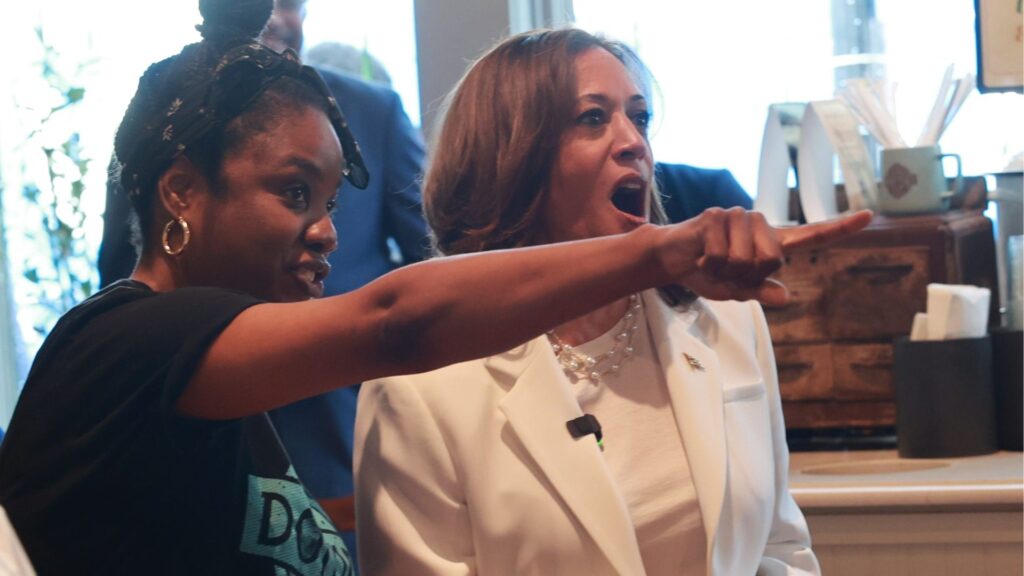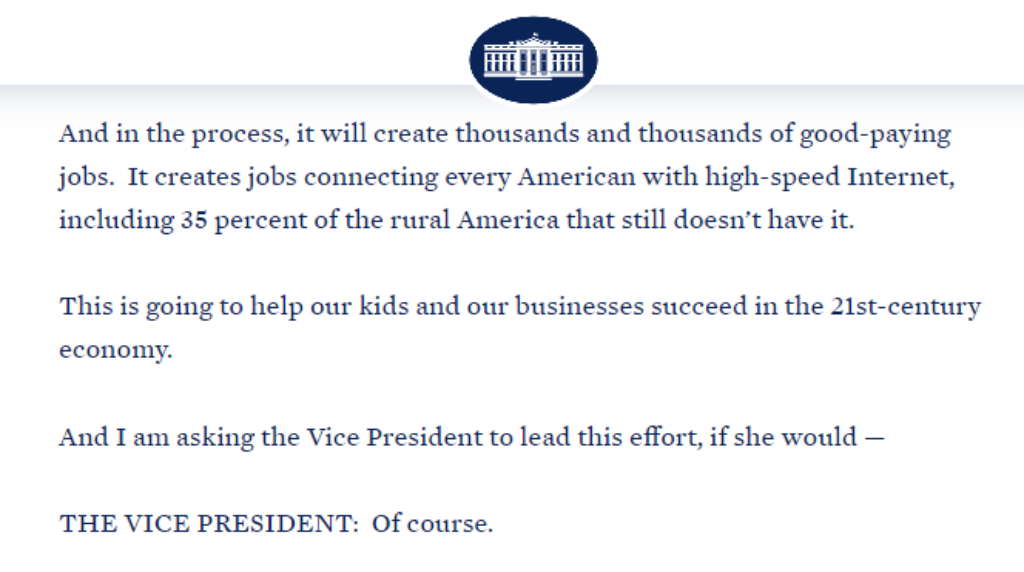A group of nine Senate Republicans, led by Sen. John Thune (R-SD), have criticized Kamala Harris for what they describe as a failed effort in expanding broadband access to underserved areas.

The senators, in a letter sent to Harris on Wednesday, expressed their dissatisfaction with her leadership as the “broadband czar,” comparing it to her widely criticized performance as the “border czar.”
BREAKING: Senators slam Kamala Harris for mismanaging the $42B broadband expansion program.
After 1,038 days, not a single person has been connected to the internet using the $42.45 billion. pic.twitter.com/PRZOM0fnVt [1]
— DogeDesigner (@cb_doge) September 18, 2024 [2]
Thune, a former chairman of the Senate Commerce Committee and current ranking member on the Commerce Subcommittee on Communications, Media, and Broadband, was joined by prominent GOP figures, including Sens. Marsha Blackburn (R-TN), Ted Cruz (R-TX), Roger Wicker (R-MS), and others in writing the letter.
Competence is underrated https://t.co/PMWo9fmw9i [3]
— Elon Musk (@elonmusk) September 18, 2024 [4]
The letter claims that Harris’s role in overseeing the $42.45 billion Broadband Equity Access and Deployment (BEAD) Program has been marked by inefficiency, delays, and added burdensome requirements that have hindered its progress.
“It appears that your performance as ‘broadband czar’ has mirrored your performance as ‘border czar,’ marked by poor management and a lack of effectiveness despite significant federal broadband investments and your promises to deliver broadband to rural areas,” the senators wrote.
The BEAD Program was established as part of the 2021 infrastructure law, with the goal of expanding internet access to millions of Americans in rural and underserved areas.
However, Senate Republicans have pointed to numerous issues that they say have slowed the program’s rollout.
Chief among these are mandates around climate change, affordability requirements, and union labor stipulations, which they argue were never part of the original vision for the program.
The letter highlights specific concerns that progressive mandates, such as the preference for government-owned networks over private investment and restrictions on non-fiber optic projects, have contributed to significant delays in the program’s implementation.
Additionally, the Republicans expressed frustration with what they called an “inconsistent waiver process” for purchasing broadband equipment from American manufacturers, further complicating efforts to connect rural communities.
“Instead of focusing on delivering broadband services to unserved areas, your administration has used the BEAD program to add partisan, extralegal requirements that were never envisioned by Congress and have obstructed broadband deployment,” the letter stated.
“By imposing burdensome climate change mandates on infrastructure projects, prioritizing government-owned networks over private investment, mandating the use of unionized labor in states, and seeking to regulate broadband rates, your administration has caused unnecessary delays, leaving millions of Americans unconnected.”
The letter also referenced recent reporting, including by Politico, which noted that partisan disagreements over certain requirements, particularly related to affordability, have stalled the BEAD program.
Despite these concerns, no construction projects under the program are expected to begin until at least 2025.
Kamala Harris has made broadband expansion a central part of her platform, often touting her role in promoting the infrastructure law and the American Rescue Plan.
On her campaign website, Harris highlights her work on expanding connectivity, saying, “This has included investing billions to help connect all Americans to accessible, affordable internet.”
Joe Biden also mentioned Harris’s leadership in broadband expansion during his first State of the Union [5] address on April 29, 2021.

In response to the GOP’s criticism, the Biden-Harris administration has defended the progress of the BEAD program, emphasizing that it is adhering to the timeline outlined in the infrastructure law.
Politicians like Kamala sell the idea of doing something seeking to take credit for it before anything actually happens.
Then when/if money is earmarked for _______ (fill in the blank project) it’s more often than not a wholly unsuccessful boondoggle.
NOTE: This isn’t an… https://t.co/j5jy3qJ1Ae [6] pic.twitter.com/fzDAzUveme [7]
— AwakenedOutlaw⚒️ (@AwakenedOutlaw) September 18, 2024 [8]
The National Telecommunications and Information Administration (NTIA), which is overseeing the program, released a fact sheet last week stating that the administration “met or exceeded all statutory deadlines” to keep the project on track.
The NTIA also pointed out that delays were partly due to the need for accurate broadband maps to ensure investments were steered to areas most in need of access.
During a recent House Energy and Commerce Committee hearing on the BEAD program, some witnesses defended the planning and requirements set forth in the infrastructure law, arguing that they were necessary to ensure the program’s long-term success.
Democrats on the committee also pushed back against claims of mismanagement, with Rep. Frank Pallone (D-NJ) asserting, “We all want these networks deployed as soon as possible, but the process and timeline is exactly what the law requires and what is needed to get the job done right.”
How do you “mismanage” $42B? https://t.co/i3srndfEvK [9] pic.twitter.com/QSEeV4Bofo [10]
— Conservator – Based Warrior of the Wastes ⚔🛡 (@SkelebroMOTU) September 18, 2024 [11]
The Republican senators, however, remain unconvinced, concluding their letter by accusing the administration of misusing taxpayer dollars and failing to connect Americans in need of broadband. “The administration’s lack of focus on truly connecting the unconnected has failed the American people and represents a gross misuse of limited taxpayer dollars. The American public deserves better,” they wrote.
As the 2024 presidential election approaches, broadband access will likely continue to be a key issue, especially as Kamala touts her role in the Biden-Harris administration’s efforts to expand connectivity.